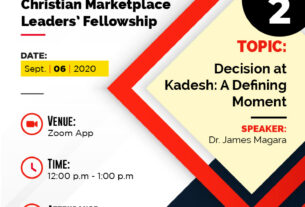By David Sseppuuya, Sunday 6 October, 2019
Uganda Jubilee Network, Marketplace Leaders Fellowship
Piato Restaurant, Kampala
It used to be that when an ambitious military officer wanted to take over the affairs of state, they would send two platoons of soldiers and a company of tanks to the national radio and television, make a ranting announcement, and with that they would take power and assume leadership of the nation.
It used to be that when an ambitious businessman wanted to expand their empire, they would buy one or two reporters in the main newspaper or television and use them to push their stories.
It used to be that when a family dynasty wanted to spread its influence or a business needing to expand its market share, they would purchase a controlling interest in a major media outlet: the Moi family did it with the Standard Media Group in Kenya; Jeff Bezos, the man behind Amazon, did it by buying the ‘Washington Post’.
Are any of these approaches still effective, let alone desirable?
So how does a leader relate to the media?
Narrow Definition
The Media, in its simplest contemporary understanding, can be defined as the main means of mass communication (broadcasting, publishing, and the Internet) regarded collectively. There have also been different forms of media for communication at different stages of human history.
Wider Definition
Media is the form (or medium) through which knowledge is passed on. Media has evolved even as human society has advanced.
Media as Purveyor of Knowledge
Many of us struggle with colleagues who have limited knowledge, when their only knowledge is the immediate technical skill it takes to execute their job – beyond that they know nothing:
- Unaware of news developments
- Ignorant of industry trends
- Oblivious of convergence of history and the contemporary
- Uninformed on functionality of other sectors
- Blind to global developments
If as a leader you are unaware of the impact of digital disruption across industries and sectors, how will you plan strategically for your organisation? If you do not know inflation trends, how will you project profitability for the next financial year? If you are unaware that Uganda’s election year tends to lead to capital flight, how will you plan your investments for 2020/2021? If, as a Christian, you do not understand prophecy, how will you know the coming moves of God, and be able to appropriate them?
Recently I visited a prominent Christian businessman and he implored me to identify for him mature and well-exposed Christians he can place in positions of responsibility. “This place is full of Christians – they can pray!” But they are unaware!
Through God’s words we gain an understanding that God is the one who gives the gift of knowledge – the understanding or awareness of something. The Lord however, grants knowledge to those who have an honest relationship with Him.
It was through reading, studying and searching that Daniel got knowledge about the prophetic destiny of his country Israel. “In the first year of his reign (Darius), I, Daniel, understood from the Scriptures, according to the word of the Lord given to Jeremiah the prophet, that the desolation of Jerusalem would last seventy years. So I turned to the Lord God and pleaded with Him in prayer and petition, in fasting, and in sackcloth and ashes.” (Daniel 9:2-3).
The Lord Jesus Himself was able to launch His Mission Statement because of an intimate awareness of Scripture, of prophecy, of history, and of the future.
“The Spirit of the Lord is on Me,
because He has anointed Me
to preach good news to the poor.
He has sent me to proclaim freedom for the prisoners
and recovery of sight for the blind,
to release the oppressed,
to proclaim the year of the Lord’s favour.”
Luke 4:18-20
That is the Nazareth Manifesto. He could launch it because He had read the scriptures (Isaiah 61:1-2), but also because He had a full awareness of the state of the people, the viciousness of the enemy, the imprisonment, the existence of good news, and the (future) year of the Lord’s favour. Jesus was knowledgeable of His commission Isaiah 61.
We are enjoined to seek knowledge: “From His mouth come knowledge and understanding” (Prov. 2:6); “The fear of the Lord is the beginning of knowledge, but fools despise wisdom and instruction” (Prov. 1:7); “The heart of the discerning acquires knowledge, for the ears of the wise seek it out” (Prov. 18:15); “The discerning heart seeks knowledge” (Prov. 15:14); “Teach me knowledge and good judgment” (Psalm 119:66).
Example 1: Imagine a new business venture, with the Mission Statement: “To publish newspapers with the sharpest investigations, most exciting sports coverage, most insightful political news”. Sseppuuya Newspapers/Spire Newspapers. That is folly: Why?
- Explosion of the Internet has increased the range of media choices available to the average reader while further cutting into newspapers’ dominance as the source of news.
- TV and the Internet bring news faster and in more visual style than newspapers, constrained by physical format and physical manufacturing and distribution
- Other media offer advertisers moving images and sound
- Internet search function allows advertisers to tailor their pitch to readers who have revealed what they are seeking
Being a little bit knowledgeable, following news, understanding trends, anticipating the future has pre-empted Sseppuuya undertaking such folly.
Example 2: By interminably delaying extraction, is Uganda missing the boat with its oil? Are Uganda’s policy makers aware that the 2020s will be the decade of the electric car? That electric vehicles could displace oil demand of 2 million barrels a day as early as 2023? That would create a glut of oil equivalent to what triggered the 2014 oil crisis? That we shall cross the oil-crash benchmark of 2 million barrels a few years later—in 2028? That crude prices could fall to $20 a barrel, when producing oil as fresh producer may not make sense?
Knowledge of car industry and oil sector trends should inform Ugandan policies. Knowledge freely available in media. Seek knowledge.
Media Platforms over the Ages
Media is principally the platform through which messages or information are relayed. Media evolves with time:
- The Finger of God: when God writes, none can change or successfully challenge. Exodus 8:16-19, when God was warning Pharaoh with Plague of Gnats, Pharaoh’s magicians fretfully recognised the Finger of God
- When God wanted to pass on to us, through Israel, His firstborn nation, He communicated through His prophet Moses with instructions written on the two tablets of the Testimony (Exodus 32:15-16) (not I-Pads or Galaxy tablets) 1446 BC
- When Jesus pronounced His Mission Statement, scripture tells us in Luke 4:17-20 that He took the scroll of the Prophet Isaiah, unrolled it, and read from it. c.29 AD
- For the Reformation to take hold and the revelation that salvation comes through faith, the Holy Spirit laid the different but convergent burdens on a handful of His children. First, in Germany, He gave wisdom to a ‘mulokole’ called Mr Guttenberg to invent the printing press. Then He convicted a priest, the Rev. Martin Luther, that there were many divine truths that the Church was mishandling, and Luther hammered those 95 theses on the church door at Wittenberg in October 1517, marking the beginning of the Reformation. The Holy Spirit then raised some of the Reformation’s key individuals in England, including King James, who sponsored the publication of the Bible, the mass-produced KJV, and Mr William Tyndale, who translated the Bible from little-spoken languages to universally spoken and available language.
- Invention of television, radio, internet, computers, mobile phones, the Internet in 20th century
- Social Media in the 21st century
Contemporary leaders should embrace social media, for it is the medium of our time.
Social media skills every leader needs
Social media has the ability to:
- Generate more efficient virtual collaboration in cross-functional projects
- Generate internal blogs
- Field discussion boards
- Convey global conversations and knowledge sharing
- Engage customers and create brand loyalty
- Advance next-generation products
Contemporary leaders should capitalise on the transformational power of social media in creativity particularly in creativity and communication. They must understand how it works, the dangers inherent, the requisite infrastructure, and acquaint themselves with the necessary tools. McKinsey & Company have drawn up imperatives that for social media that every leader needs:
- Leaders must produce – need the technical skills to master the basics of digital-multimedia production
- Leader should distribute – where they used to have a secretary type and post a memo, today a lot should come directly from the leader
- Leader should receive – and be better placed to manage the communication flow. There is so much information on the numerous social media platforms that the manager must decide which ones to take in and respond to
- Leader must drive – Managers must play a proactive role in raising the media literacy of their immediate reports and stakeholders. E.g. board members
- Leader should be designer – design an organisational infrastructure that encourages free exchange but also places controls against abuse
- Leader as analyst – must know what is coming up. Study trends in products, services, technology etc
Jesus’ Twitter Handle and Facebook page
Had he, in His human incarnation, lived in this generation, the Lord Jesus Christ would have utilised social media platforms, for they are most effective. You are of this generation – will you procure the skills and seek the knowledge that will keep you relevant?



